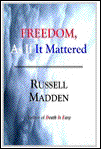 |
 |
|
|
 |
 |
|
|
Dear Mr. Ross:
Re: your commentary of 7-07-00, http://www.objectiveamerican.com/
Hmm. Despite your rather vehement description of Objectivists re: this issue of government for\ce monopoly, I decided I would re-read what Rand wrote and see if I missed something. While I doubt my points will alter your position, I offer them for what they are worth.
1. You mention the division of force via the different levels of government and division of powers, implying, it seems to me, that Rand believed only the federal government has a force monopoly. But I see no evidence that she makes any such distinction. As far as I can tell, she refers to the concept of government.
She says it "is an institution that holds the exclusive power to enforce certain rules of social conduct in a given geographical area." (original emphasis) Different levels of government fit this definition. Indeed, she specifically mentions "The American system of checks and balances was just such an achievement" (of providing objective principles for limiting government power).
2. You mention the concept of monopoly and say that words mean things and that concepts are what they are. True. But concepts are also contextual. This, it seems to me, is where the difference in opinion is most evident. You seem to be saying that Rand claimed a monopoly of force for government in any and all contexts thus conceptually excluding individual self-defense; that it is an egregious self-contradiction to claim the validity of both.
Well, to me it is clear that Rand is saying that a (moral) government exists only to enforce "certain rules of social conduct" and, moreover, that the particular rules that are relevant to the proper function of government are "objectively defined laws." I see no contradiction between this and a law which objectively recognizes the right of individuals to defend themselves. (After all, the Bill of Rights does nothing more than codify rights people already have; it merely formalizes them.)
(Cf having an absolute right to do as one pleases; as Rand points out, "absolute" does not mean in any and all contexts; only within the context of "noninitiation of force" is that right absolute.)
Furthermore, she points out that a government is an agent of the citizens; its powers are delegated. To me, if I delegate a power to someone to do X in certain contexts, that does not imply I give up my right to do X in any and all circumstances (especially if someone is misusing that power, i.e., using it against my interests and rights).
As Rand is also careful to point out, a government's powers are "rigidly defined, delimited and circumscribed...with the laws as its only motive power." (Those powers are contextually delimited.) I see nothing here that contradicts individual self-defense. (See above re: legal recognition of one's right to self-defense.)
Furthermore, Rand says, "Under a proper social system, a private individual is legally free to take any action he pleases (as long as he does not violate the rights of others), while a government official is bound by law in his every official act. A private individual may do anything except that which is legally forbidden; a government official may do nothing except that which is legally permitted." (original emphasis)
Again, I see nothing here that precludes/contradicts self-defense; self-defense violates no one's rights. In a moral society with a proper government, it would not be legally forbidden.
Rand specifically says, "The necessary consequence of man's rights to life is his right to self-defense."
To reiterate, the context in which Rand discusses government is the context of enforcing laws, of prosecuting crimes, not in the context of immediate danger requiring self-defense. She clearly is concerned overall with how to deal with general rights violations so that mob rule (e.g., lynch mobs) and group revenge is not permitted as a means to deal with perceived or actual transgressions; that the process must be objectively defined and carried out (e.g., rules of evidence, how to prove guilt, objective rules of punishment and enforcement, etc.) and not done arbitraily or in response to roused emotions.
So, I don't know what other Objectivists you have communicated with have said, but I personally believe -- and I read Rand as agreeing with me -- that there is no contradiction between a contextually delimited monopoly on force by a government and self-defense.
If my disagreement with you is an example of "sheer stubbornness," an "illogical position," "twisting" and "squirming," a "brazen contradiction," a "contortion," "utopian," "out of touch," "unwise" and "unAmerican," "ignorant" and "shallow," so be it.
If this analysis does not prove that Rand does not say what you claim she says, i.e., that you are in error, then I don't know what standard of proof you would accept, i.e., what criteria you require for accepting the above position as true.
(References from the Ayn Rand Lexicon under "government," "constitution," "law," and "self-defense.")
Russ Madden